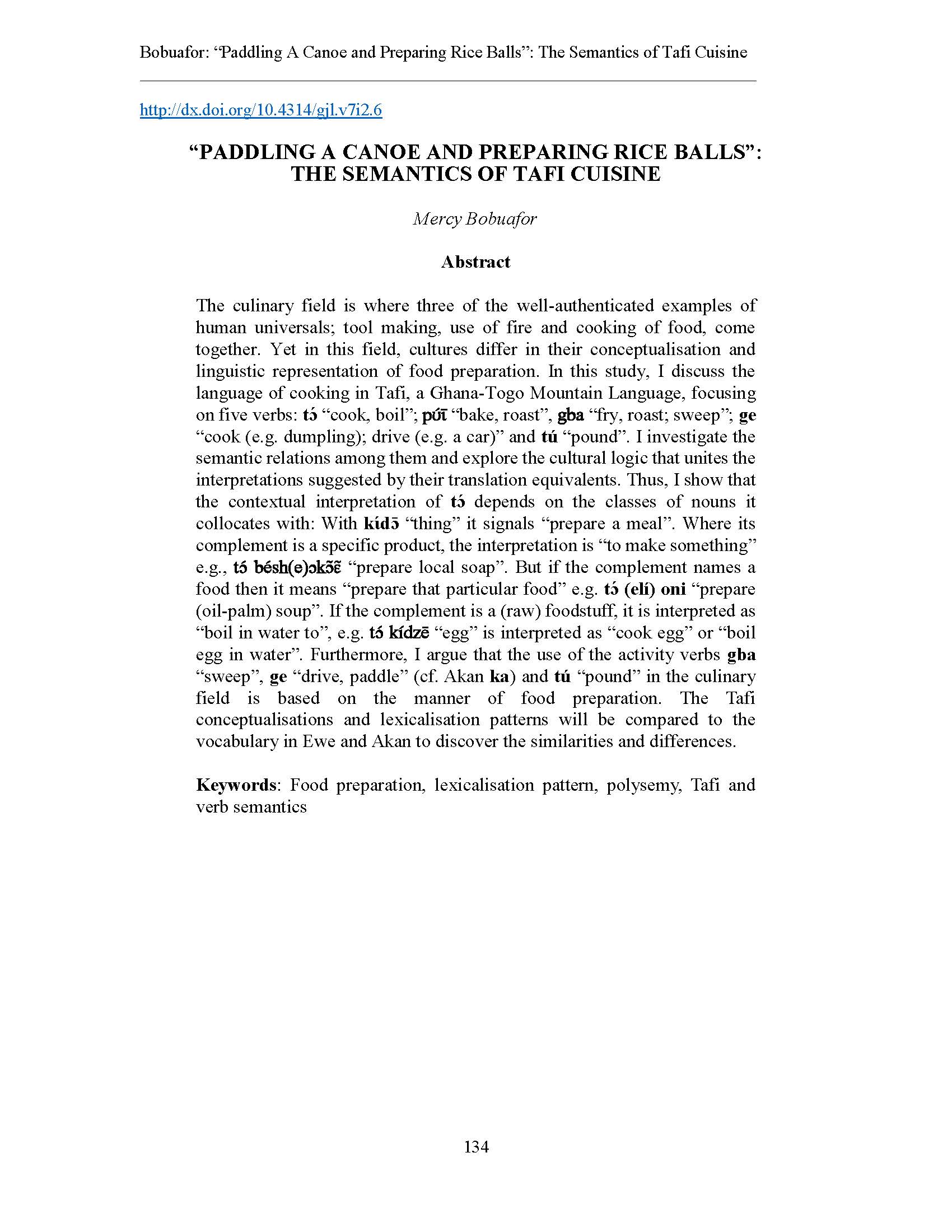“Paddling a Canoe and Preparing Rice Balls”
The Semantics of Tafi Cuisine
DOI:
https://doi.org/10.4314/gjl.v7i2.229Keywords:
Food preparation, lexicalisation pattern, polysemy, Tafi and verb semantics, food preparation, lexicalisation pattern, polysemy, tafi and verb semanticsAbstract
The culinary field is where three of the well-authenticated examples of human universals; tool making, use of fire and cooking of food, come together. Yet in this field, cultures differ in their conceptualisation and linguistic representation of food preparation. In this study, I discuss the language of cooking in Tafi, a Ghana-Togo Mountain Language, focusing on five verbs: tɔ́ “cook, boil”; pʊ́ɩ̄ “bake, roast”, gba “fry, roast; sweep”; ge “cook (e.g. dumpling); drive (e.g. a car)” and tú “pound”. I investigate the semantic relations among them and explore the cultural logic that unites the interpretations suggested by their translation equivalents. Thus, I show that the contextual interpretation of tɔ́ depends on the classes of nouns it collocates with: With kɩ́dɔ̄ “thing” it signals “prepare a meal”. Where its complement is a specific product, the interpretation is “to make something” e.g., tɔ́ bésh(e)ɔkɔ̃ɛ̃ “prepare local soap”. But if the complement names a food then it means “prepare that particular food” e.g. tɔ́ (elí) oni “prepare (oil-palm) soup”. If the complement is a (raw) foodstuff, it is interpreted as “boil in water to”, e.g. tɔ́ kídzē “egg” is interpreted as “cook egg” or “boil egg in water”. Furthermore, I argue that the use of the activity verbs gba “sweep”, ge “drive, paddle” (cf. Akan ka) and tú “pound” in the culinary field is based on the manner of food preparation. The Tafi conceptualisations and lexicalisation patterns will be compared to the vocabulary in Ewe and Akan to discover the similarities and differences.
References
Bobuafor, Mercy L. 2009. “Noun classes in Tafi.” In The linguistics of endangered languages: morphology and syntax, edited by M. Leo Wetzels, 267-307 LOT Occasional Papers, Utrecht.
Defina, Rebecca. 2016. Events in language and thought: The case of serial verb constructions in Avatime. Dissertation. Radboud University Nijmegen & Max Planck Institute for Psycholinguistics, Nijmegen.
Essegbey, James. 2010. “Locative constructions in Tutrugbu: Losing typological
characteristics due to contact.” The Journal of West African Languages. 37(1): 93-118.
Fillmore, Charles J. 2006 [1982]. “Frame semantics.” In Cognitive linguistics: Basic readings, edited by Dirk Geeraerts, 373-400. Berlin: Mouton de Gruyter
Fillmore Charles & Atkins B. 1992. “Toward a frame-based lexicon: The semantics of RISK and its neighbors.” In Frames, fields, and contrasts: New essays in semantic and lexical organization, edited by Adrienne Lehrer & Eva Feder Kittay, 75-102. Hillsdale, Erlbaum.
Lehrer, Adrienne. 1974. Semantic fields and lexical structure. Amsterdam: North Holland.
Lehrer, Adrienne & Kittay Eva Feder. 1992. “Introduction.” In Frames, fields, and contrasts: New essays in semantic and lexical organization, edited by Adrienne Lehrer & Eva Feder Kittay, 1-18. Hillsdale, Erlbaum.
Lyons, John. 1977. Semantics. Cambridge University Press.
Petruck, M. 1996. “Frame Semantics.” In Handbook of Pragmatics, edited by J-O Östman, J. Blommaert and C. Bulcaen, 1-13. Amsterdam/Philadelphia, Benjamins.
Simons, Gary F. and Charles D. Fennig (eds.). 2018. Ethnologue: Languages of the World, Twenty-first edition. Dallas, Texas: SIL International. Online version: http://www.ethnologue.com.
Trier, J. 1931. Der Detsche Wortschatz im Sinnbezirk des Verstandes. Heidelberg: Winter.
van Putten, Saskia. 2014. Information structure in Avatime. Dissertation. Radboud University Nijmegen & Max Planck Institute for Psycholinguistics, Nijmegen.

Downloads
Published
How to Cite
Issue
Section
License
The Ghana Journal of Linguistics is published by the Linguistics Association of Ghana, P. O. Box LG 61, Legon, Accra, Ghana.
LAG Email: linguisticsgh@gmail.com. Website: http://www.laghana.org
GJL Email: gjl@laghana.org Website: http://www.laghana.org/gjl
© Linguistics Association of Ghana and individual authors, 2023.
